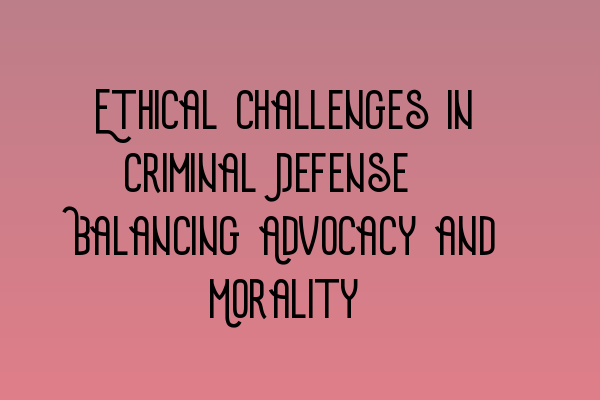Ethical Challenges in Criminal Defense: Balancing Advocacy and Morality
As criminal defense solicitors, we are faced with a unique set of ethical challenges in our practice. On one hand, we are advocates for our clients, tasked with zealously defending their rights and interests. On the other hand, we must also adhere to a moral compass that guides our actions and ensures justice is served.
The Role of the Criminal Defense Solicitor
Before delving into the ethical challenges, it is important to understand the role of a criminal defense solicitor. Our primary duty is to provide legal advice and representation to individuals or organizations facing criminal charges. We must ensure that our clients receive a fair trial, have their rights protected, and are given the best possible defense.
While this may seem straightforward, the reality is that criminal defense often involves representing individuals accused of serious crimes. This can present ethical dilemmas that require careful consideration and decision-making.
Advocacy vs. Morality: Striking a Balance
One of the key ethical challenges faced by criminal defense solicitors is the tension between advocacy and morality. Our duty as advocates is to provide the strongest possible defense for our clients, irrespective of their guilt or innocence.
However, this raises the question of whether we should defend clients whom we suspect or know to be guilty. This is where the balance between advocacy and morality becomes crucial. We must recognize that everyone has the right to a fair trial and legal representation, regardless of the nature of the charges against them.
Confidentiality and Loyalty to Clients
Another important ethical consideration in criminal defense is the principle of client confidentiality. We are bound by legal and ethical obligations to maintain the privacy of our clients and protect confidential information shared with us.
This duty of confidentiality can sometimes conflict with our moral obligations. We may uncover evidence or information that could potentially harm others or even the client themselves. In such cases, we must carefully navigate the boundaries of our duties, ensuring we are not complicit in any wrongdoing while fulfilling our role as advocates.
Dealing with Difficult Clients
Working as a criminal defense solicitor often means representing clients who may be difficult, challenging, or even uncooperative. This can create ethical dilemmas in terms of how we handle their cases and interact with them.
We must navigate the delicate balance of providing effective representation while maintaining our professional and ethical standards. It is our responsibility to ensure our clients understand the legal process, their rights, and the potential consequences of their actions. At the same time, we must treat all clients with respect and dignity, regardless of their behavior or personal circumstances.
Conclusion
Ethical challenges are an inherent part of criminal defense practice. Striking a balance between advocacy and morality is a constant struggle that requires careful consideration and decision-making.
As criminal defense solicitors, we must constantly evaluate and re-evaluate our actions, ensuring that we remain true to our duty to clients while upholding the highest ethical standards. By doing so, we can fulfill our role as advocates for justice while maintaining the integrity of the legal profession.
Related Articles:
- Legal Representation for Delaware LLCs in the UK: Expert Advice
- SQE Exam Prep: Essential Study Materials for Aspiring Solicitors
- Expert Testimonies in UK Courts: Building Strong Cases
- Demystifying the Solicitors Qualifying Examination Format
- SQE Exam for International Lawyers: Challenges and Success Strategies
